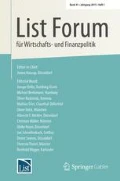Zusammenfassung
Gemäß dem „Varieties of Capitalism“-Ansatz können Liberale und Koordinierte Marktwirtschaften unterschieden werden. Der „Baltische Kapitalismus“, also das Wirtschaftssystem in Estland, Lettland und Litauen, gilt dabei als typische Liberale Marktwirtschaft. Wie in dem Aufsatz gezeigt wird, konvergieren Estland und Litauen seit einiger Zeit, während Lettland hinterher hängt. Dadurch erreichten diese beiden Länder höhere Freiheitsniveaus und parallel höhere Pro-Kopf-Einkommen.
Abstract
According to the varieties of capitalism approach liberal market economies and coordinated market economies can be distinguished. Baltic Capitalism, the economic systems in Estonia, Latvia and Lithuania, is a typical liberal market approach. As is shown in this article there exists a convergence of the Estonian and the Lithuanian model of capitalism while Latvia is lagging behind. Both countries reached a higher level of liberalism within the last years as well as a higher per capita income.




Notes
Vgl. Ahlborn et al. (2014), S. 22–23.
Vgl. Kuokštis (2012), S. 19.
Vgl. Ahlborn et al. (2014), S. 4.
Vgl. Ahlborn et al. (2014), S. 12–17.
Vgl. Kuokštis (2012), S. 19.
Vgl. Maslauskaite und Zorgenfreija (2013), S. 34–35.
Vgl. Winkelmann (2013), S. 85.
Vgl. Norkus (2012), S. 211.
Vgl. Wrobel (2011), S. 40.
Vgl. Buchen (2010), S. 76.
Vgl. Winkelmann (2013), S. 87.
Vgl. Wrobel (2015), S. 12.
Vgl. Norkus (2012), S. 211.
Vgl. Schrader und Laaser (2014), S. 13.
Vgl. EZB (2014), S. 121.
Vgl. dazu z. B. Wrobel (2013).
Vgl. Norkus (2012), S. 211–212.
Vgl. Maslauskaite und Zorgenfreija (2013), S. 35.
Vgl. Schrader und Laaser (2014), S. 5.
Vgl. World Economic Forum (2014), S. 11.
Vgl. Kuokštis (2012), S. 13.
Vgl. Maslauskaite und Zorgenfreija (2013), S. 36–38.
Heritage Foundation (2015).
Literatur
Ahlborn, M., Ahrens, J., & Schweickert, R. (2014). Largescale transition of economic systems: Do CEECs converge towards western prototypes? PFH Forschungspapiere/Research Papers, Bd. 2014/05. Göttingen: PFH Private Hochschule Göttingen.
Albert, M. (1993). Capitalism Against Capitalism: How America’s Obsession with Individual Achivement and Short-term Profit Has Led It to the Brink of Collapse. New York: Four Wall Eight Windows.
Bohle, D., & Greskovits, B. (2012). Capitalist diversity at Europe’s periphery. Ithaka: Cornell University Press.
Buchen, C. (2010). Emerging economic systems in Central and Eastern Europe – a qualitative and quantitative assessment. Wiesbaden: Eigenverlag.
EBRD (2014). Transition report 2013: stuck in transition? London: EBRD.
EZB [Europäische Zentralbank] (2014). Convergence Report (June 2014. Aufl.).
Hall, P., & Soskice, D. (2001) Varieties of Capitalism: The Institutional Foundations of Comparative Advantage. Oxford: Oxford University Press.
Heritage Foundation (2015). Economic Freedom Index. http://www.heritage.org.
Kuokštis, V. (2012). Baltic variety of capitalism as an explanation of the success of internal devaluation. In L. Kosals et al. (Hrsg.), Governance failure and reform attempts after the global economic crisis of 2008/09: case studies from central and eastern europe (S. 13–28). Stuttgart: Ibidem-Verlag.
Maslauskaite, K., & Zorgenfreija, L. (2013). Economic miracle in the baltic states: an exemplary way to growth? In A. Grigas, A. Kasekamp, K. Maslauskaite, & L. Zorgenfreija (Hrsg.), The baltic states in the EU: yesterday, today and tomorrow, studies & reports no. 98 (S. 33–64). Berlin: Jacques Delors Institute.
Nölke, A., & Vliegenthart, A. (2009). Enlarging the varieties of capitalism: the emerge of dependent market economies in east central europe. World politics, 61(4), 670–702).
Norkus, Z. (2012). On baltic Slovenia and adriatic lithuania: A qualitative comparative analysis of patterns in post-communist transformation. Vilnius: Apostrofa/CEU Press.
Schrader, K., & Laaser, C. (2014). Lettland: Fit für den Euro? Kieler Diskussionsbeiträge, Bd. Nr. 532/533. Kiel: IfW.
Winkelmann, R. (2013). Litauen. In G. Heydemann, & K. Vodička (Hrsg.), Vom Ostblock zur EU: Systemtransformation 1990–2012 im Vergleich (S. 77–100). Göttingen: Vandenhoeck & Ruprecht.
World Economic Forum (2014). The Global Competitiveness Report 2014–2015. Geneva: World Economic Forum.
Wrobel, R. (2011). Die Euro-Einführung in Estland: Ein Anachronismus? Orientierungen zur Wirtschafts- und Gesellschaftspolitik, 128(2/2011), 39–43.
Wrobel, R. (2013). Estland. In G. Heydemann, & K. Vodička (Hrsg.), Vom Ostblock zur EU: Systemtransformation 1990–2012 im Vergleich (S. 17–45). Göttingen: Vandenhoeck & Ruprecht.
Wrobel, R. (2015). From independence to the Euro introduction: varieties of capitalism in the Baltic States. Central and Eastern European Journal of Management and Economics, 3(1), 9–38.
Author information
Authors and Affiliations
Corresponding author
Rights and permissions
About this article
Cite this article
Wrobel, R. Baltischer Kapitalismus: Konvergierende Wirtschaftssysteme?. List Forum 41, 499–508 (2016). https://doi.org/10.1007/s41025-016-0031-9
Published:
Issue Date:
DOI: https://doi.org/10.1007/s41025-016-0031-9

